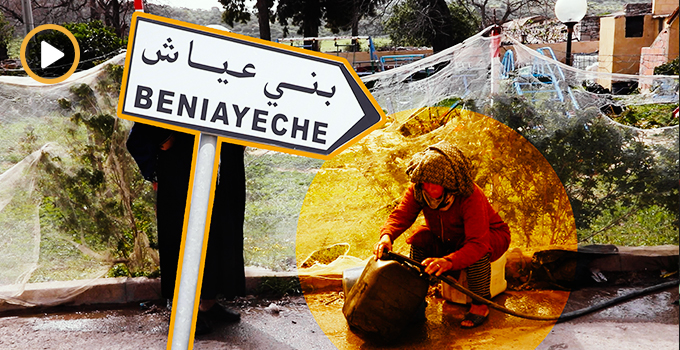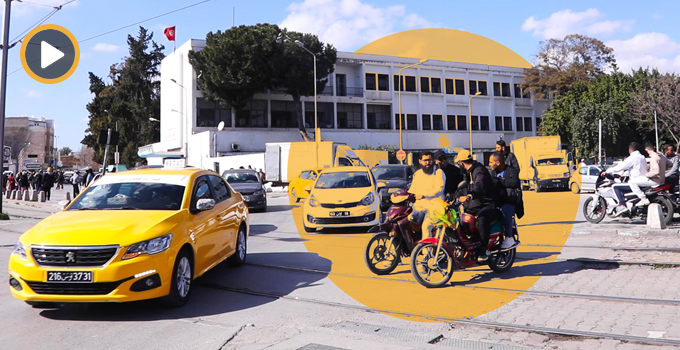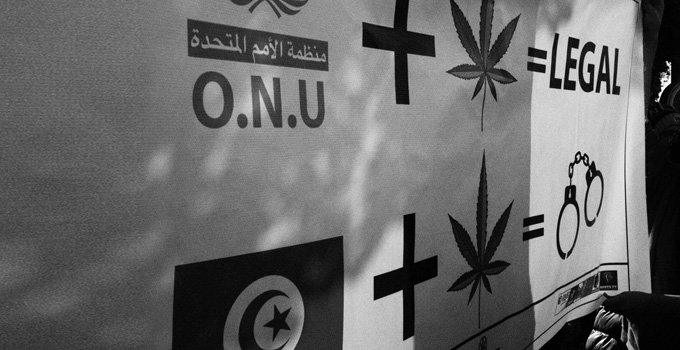
The Femen ‘storm’ Reaches Tunisia
The debate over nudity and feminism kicked off in Tunisia since Amina posted a photograph of herself with the words “Fuck your morals” written across her chest, to the Femen-Tunisia Facebook page. The reactions were tense and angry. Interestingly, Tunisian self-identified secular activists denounced Amina and her photos. They claimed it was counterproductive to the feminist cause to pose topless as it would give Islamists a pretext to lash out at powers that struggle to preserve the secularity of the state. The Wahhabi Salafi preacher Adel Almi, who heads the Commission for the Promotion of Virtue and Prevention of Vice, underlined the hardliners’ position.
“The young lady should be punished according to sharia, with 80 to 100 lashes, but [because of] the severity of the act she has committed, she deserves be stoned to death”. He added: “Her act could bring about an epidemic. It could be contagious and give ideas to other women. It is therefore necessary to isolate [the incident]. I wish her to be healed.” “The page has been hacked and God willing, this debauchery will disappear from Tunisia.” One message read on the hacked Facebook page of the Tunisian Branch of Femen.
After receiving death threats, Femen representatives said they had lost contact with 19-year-old woman and concerned for her life. More than 94,000 people have signed a petition calling for those who have threatened Amina’s life to be prosecuted. According to Bouchra Bel Haj Hmida, a well-known woman’s rights activist and lawyer, Amina Tyler is safe.
Drafters of the Tunisian Constitution Envisage Allocating Seats in Parliament for Jews
To empower the Jews politically, the drafters of the post- revolution constitution indicated in discussions that Jews representatives should be granted permanent seats in Parliament. Rhetoric for and against the plan has been fervent. For critics, the plan to allocate seats in the country’s new parliament to Jews is absurd and a step that further ingrains discrimination. “We would like to see the government seriously criminalize all forms of discrimination, stop protesters who call for the murder of Jews, stop imams who call for the torture of non-Muslims, and non-Muslims should be allowed to serve as president.” Declared Yamina Thabet, the president of the Tunisian Association for the Support of Minorities.
Roland Sa’ada, A local Jewish community leader, commented about the proposal: “I am a Tunisian like any other Tunisian, and I want a parliament where people are elected based on their qualifications to serve the people and not on their religious confessions.” Supporters of the plan claim that it is the most direct way to establish a participatory democracy in Tunisia.
Tunisia to Stop Jihad Recruitment to Fight in Syria
The issue of Tunisian fighters who have joined the war against Bashar al-Assad has garnered a great deal of attention in recent days. According to local media outlets, thousands of young Tunisians recruited by local and regional networks are fighting government forces in Syria. To stem the flow of fighters into Syria, the Tunisian ministry urged people with leads on who was recruiting people to fight in Syria to “get in touch with the competent authorities.”
On the other hand, Tunisia Prime Minister Ali Larayedh said last week that the authorities have no legal right to stop a Tunisian citizen from crossing into another country. The general climate in post-revolutionary Tunisia has encouraged the proliferation of extremist groups. They would join the jihadist faction within the broader rebel movement.
Tunisia Takes War on Al-Qaeda
Tunisia is considering setting up crisis cells in a bid to fight terrorism’s grip on the country. The chief of the U.S. Africa Command has warned about al-Qaida attempts to establish a base in Tunisia.
We have launched the creation of crisis cells to monitor terrorist activities on the border [with Libya and Algeria] and in the interior, faced with the rise of the radical Salafist movement and the existence of recruitment networks,
Interior Minister Lotfi Ben Jeddou told Constituent Assembly.
Terrorism presents yet another security problem for Tunisia. The task of healing Tunisia’s battered economy is certain to be made harder by an erratic security situation. The same economic difficulties that led to Ben Ali’s ouster have continued to plague Tunisia two years after the revolution. Early this month, a young Tunisian cigarette vendor has died after self-immolating – an act reminiscent of the event which triggered the “Arab Spring” in 2010.





NO future for violence!! NO future for ignorance!! Future is ONLY for tunisians all tunisians! jews christians muslims must live in peace & brotherhood as always in Tunisia, nothing else will be accepted but only peace.
the world is already a ;’BROTHERHOOD’ and this is why it is in one awful state!
“SISTERHOOD” Will offer salvation and freedom. MORE FEMALE LEADERS IS THE “CURE” FUCK YOUR RELIGION, FUCK YOUR SICK “MORALS” BACKWARD ISLAMIC CUNTS.
Shadow boxing is popular nowadays :)
[…] minacce di morte per la ragazza. Solo pochi giorni fa Nawaat, piattaforma di blogger tunisini, ha affrontato per la prima volta il caso di […]
[…] Salafis responded predictably; Adel Almi, head of the Tunisian Commission for the Protection of Virtue and Prevention of Vice, said, “The […]
[…] Almi is a Tunisian preacher who runs the “Commission for the Promotion of Virtue and Prevention of Vice,” and he has […]
[…] Almi is a Tunisian preacher who runs the “Commission for the Promotion of Virtue and Prevention of Vice,” and he […]
[…] Almi is a Tunisian preacher who runs the “Commission for the Promotion of Virtue and Prevention of Vice,” and he […]
An epidemic of giving women ideas? WI guess omen having *ideas*??!!?!?!? Who-ever heard such a thing? It’s not like women have brains that are designed to hold an actual *idea* or anything like that.
/sarcasm mode
[…] minacce di morte per la ragazza. Solo pochi giorni fa Nawaat, piattaforma di blogger tunisini, ha affrontato per la prima volta il caso di […]